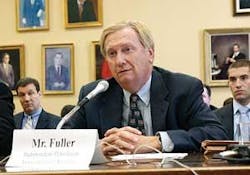Industry in the Crosshairs: IPAA’s fight to shape national energy policy
Mikaila Adams, Associate Editor, OGFJ
null
For nearly 80 years, the Independent Petroleum Association of America (IPAA) has been a member-driven organization. Representing more than 5,000 companies in 46 states and 525 cities nationwide, IPAA is the largest national-level organization protecting the interests of the American exploration and production industry.
Ensuring energy voices are heard in Washington is a big job, one that IPAA president and CEO Barry Russell knows well. It is his responsibility to coordinate the staff and the association’s day-to-day business. Chairman Buddy Kleemeier, president and CEO of privately-held, Tulsa, Okla.-based Kaiser Francis Oil Co.; and vice chairman Bruce Vincent, president and CEO of Houston-based Swift Energy also serve in integral roles in the organization.
Russell, Kleemeier, Vincent, and the other board members work in conjunction with IPAA staff and members of key policy committees on issues of the utmost importance to the energy industry. Issues such as research and development, natural gas regulation, national energy education, workforce development, capital markets, business development, the environment, and supply and demand are always at the forefront.
IPAA policies and issues are determined by an elected, volunteer board of directors representing companies large and small, public and private, from every producing state and region.
“The result is one of the strongest, most unified voices for the industry in Washington, DC,” said Russell.
Russell boasts that the current IPAA staff is “among the best we’ve ever had” and has won awards and been recognized by national publications for its work in the legislative, as well as communications arenas.
Today’s IPAA staff consists of former congressional staff directors and chiefs of staff, White House legislative and media aides, House and Senate legislative assistants, political campaign aides, regulatory officials, as well as public relations, economic, international and financial executives.
A good arsenal to have when the industry is once again in the crosshairs and facing some tough challenges. At a December 12 IPAA/TIPRO luncheon at the Houston Petroleum Club, Chairman Kleemeier warned attendees that the industry is the ‘No. 1 political target’ and encouraged participants to ‘stick together.’
Current challenges
The economy
One recent development is the looming ‘credit crunch’ and the threat it poses to the economy and the oil and gas industry.
Bill Moyer, vice president of capital markets, business development, and membership sees the impact. “From a macro-economics side, the credit crunch is affecting the entire national and global economy and no sector is spared despite its seeming detachment from home mortgages. It affects banks’ lending, which will affect merger and acquisition deals and all borrowing.”
He warns that “the macro picture could change things even for our industry if the credit crunch does lead to a recession and oil and gas drilling does decline due to lower commodity prices.”
But, while a recession would slow things down, Moyer notes a possible silver lining. A Raymond James analyst recently commented that a recession is likely already built into the supply numbers for commodities, and that OPEC has a new ceiling of at least $70 oil.
On the micro-side and speaking more to IPAA member companies, there “doesn’t seem to be a lack of funding for oil and gas deals, particularly with more than $20 billion of private equity still targeted towards oil and gas,” said Moyer. “The crunch will probably have some effect on how banks and other capital providers price and structure the deals since there is a new perceived level of risk exposure in the market, but this shouldn’t have any effect on getting deals done,” he continued.
“Pricing may go up a little and the structures (loan covenants) will get tightened a bit, but if you have a good management team and assets, you will find the capital you need,” he assured.
Federal budget
Another development possibly affecting the energy industry is the Bush Administration’s federal budget proposal that would zero-out all federal funding for oil and natural gas research and development programs at the Department of Energy.
“The Energy Department is abandoning the future growth of America’s largest and most vital energy resource,” said Russell. “The Administration needs to encourage the development of all viable energy fuels while simultaneously embracing conservation and efficiency measures, but to jeopardize proven home-grown energy solutions like oil and natural gas is a threat to this country’s energy security, economy, and consumer well-being. How can we have an Energy Department that ignores America’s largest source of energy?”
Senator Jeff Bingaman (D-NM), chairman of the Senate Energy and Natural Resources Committee, echoed IPAA’s displeasure. “This Administration has a real blind spot when it comes to developing new domestic natural gas resources. The gas that is most available to the consumers who need it is located onshore, and the key players in developing it are independent oil and gas producers.”
The IPAA believes ongoing research and development is needed to keep natural gas flowing in an economic and environmentally responsible manner, and fears consumers will pay higher prices if such practices are not supported. Significantly, the research and development projects being threatened are managed primarily by universities.
“Maintaining strong university programs to educate the essential engineers and scientists who will become America’s next generation of energy industry leaders is critical,” said Russell.
Foreign oil dependency
Energy costs, security, efficiency, and reserves are among the most talked about issues facing America and the economy. “Our best defense against foreign oil dependency is developing the vast oil and natural gas resources we have here in America,” said Russell.
The majority of these resources remain off limits. According to the IPAA, nearly 85% of the nation’s offshore resources are restricted by the government for exploration, which if developed, could replace Persian Gulf imports for the next 59 years. The organization also points to ‘off-limits’ natural gas reserves in non-park, non-wilderness government lands in the Intermountain West that could heat 50 million US homes for the next 60 years.
Oil and natural gas provide two-thirds of America’s energy needs, as well as the fuel needed for many alternative energy projects. While the organization does not dispute the need for variety in energy production, it warns “that even with a fivefold increase in renewables like wind and solar over the next 25 years, they would make up less than 1% of the total energy mix.”
On a positive note, natural gas is likely to be a beneficiary of global climate proposals if the supply is made available. Alternative fuel proposals are focusing on ethanol, and natural gas is a key component of ethanol production as both fuel for ethanol refineries and as fertilizer feedstock.
According to Russell, the issue then becomes one of access. “We must find ways to get more natural gas supplies if we want to be part of the solution. We must make sure that Congress understands the role that oil and natural gas will play in the future.”
For this reason, the organization has strengthened its relationships with energy consumer groups such as the manufacturing and chemical industries over the past few years. “They have been an important ally in helping us convince Congress to ensure a healthy domestic supply of natural gas,” explained Russell.
“While America should embrace, and will need, all forms of energy in the future, including alternatives, the fact remains that oil and natural gas will supply the nation’s energy for at least the next 30 years. Any new energy proposals should recognize this fact,” he said.
Opposition
There are two sides to every story, and to ensure the collective voice of the energy industry is heard, the IPAA is both proactive and reactive in its efforts to counteract those that oppose American oil and natural gas development. These efforts are spread across a number of internal teams throughout the organization.
The communications team has a rapid response program that monitors hundreds of newspapers, magazines, and other media. The Community Voices program encourages members to get to know their local news reporters, as well meet regularly with community and local leaders. The government relations team meets with policymakers and regulators in Washington.
Russell is adamant about spreading “the truth about our industry, instead of leaving it to the extreme activists who would love to craft a story about us.”
To hear him explain it, it’s just another day at the office. For example, an article in the December 30 issue of Parade magazine suggested the exploration and production industry was exempt from environmental regulations. Russell was quick to point out that the article only quoted one source from the Natural Resources Defense Council.
The organization immediately sent out a rebuttal to the magazine and provided sample letters to its entire network of grassroots members. “The result was hundreds of letters to the editors of Parade. I think we made our point,” he said. “With our industry, we have to expect a lot of opposition, but more importantly we have to be willing to counter it,” he explained.
Taxes
Yet another challenge for the IPAA is fighting politicians who want to use the industry as a ‘cash register.’ Russell feels the majority party in Congress wants to use the industry to “fund its political programs while simultaneously pushing proposals that will add new barriers to the development of onshore and offshore federal lands; repeal royalty incentives for offshore development; and impose a ‘conservation fee’ and prohibitions on new leasing for leaseholders in the Gulf of Mexico without price caps on 1998-99 deep water leases.”
A related concern comes as oil prices flirt at the $100/barrel mark and the industry continues to post strong earnings. IPAA fears that Congress is “unwilling to accept market forces and simple supply vs. demand rationale as an explanation – and they want the industry to pay more taxes and royalties,” said Russell.
Some members of the Democratic Party believe that Republicans passed energy and tax legislation in 2005 that inappropriately favors the oil and natural gas industry. Russell worries that some members of Congress may seek retribution in the form of a renewed Windfall Profits Tax like the one enacted in the US in 1980.
For the organization, the ‘best case scenario’ would be to convince Congress to do no harm. “We must educate members that new taxes, royalties, and regulations will decrease American investments and competitiveness,” explained Russell.
Political efforts
In addition to these challenges, 2008 presents a new fight. This is an election year – an especially important election year in the eyes of the industry. The President, the House of Representatives, and one-third of the US Senate will be voted into office. The people elected to serve in these positions can impact the oil and gas industry’s profits, dictate where companies can and cannot drill, and impart stricter environmental regulations that could negatively affect the industry.
While they work closely everyday with ‘traditional allies,’ the IPAA has spent the last year and a half working with the election in mind. The IPAA has “made it a priority to reach out to those candidates and policymakers who haven’t been fully educated on our issues over the years, including the new Speaker Nancy Pelosi, Senate Majority Leader Harry Reid, and democratic committee chairmen,” said Russell.
Information dissemination
Providing information to Congress and others, and ensuring that the IPAA is an available and valuable resource is a priority. The IPAA boasts the “largest, industry-coordinated grassroots network through which tens of thousands of industry employees, IPAA members, affiliated organizations, and cooperating associations can send letters and faxes to elected officials on key votes. There’s no better lobbying technique than hearing from the local constituents who matter most,” explained Russell.
The organization has provided talking points and fact sheets to every congressional office and boasts a new electronic way of communicating with congressional staff at a moment’s notice.
Another way the organization reaches out is through its ‘Adopt a Member of Congress’ program. IPAA members meet regularly with members of Congress in their respective state or district. The expansion of the program means IPAA will have a regular presence at town hall meetings, candidate meet-and-greets, and campaign events.
Fundraising
Fundraising also plays a role in the organizational efforts. One source of funding is through the organization’s political action committee (PAC) – the IPAA Wildcatters Fund. It is now the largest trade association PAC in the oil and gas industry, and, one of the largest overall.
The IPAA Wildcatters Fund is funded exclusively by voluntary contributions from IPAA members across the country. Contributions go towards electing candidates to Congress who support the IPAA’s legislative objectives.
Sponsorships
IPAA is also sponsoring presidential events this year – from the presidential forum and energy expo in Houston, to the Republican Convention in Minneapolis, and the Democrat Convention in Denver. “When the candidates are chosen, we’ll be providing the campaigns with all the necessary materials to help defend America’s oil and natural gas industry,” said Russell.
Business development efforts
Service and networking
Since 1929, IPAA’s top priority has been to protect independent producer interests at the federal level, but over the last several years, it has also grown into a service-oriented organization. “Today, IPAA provides unparalleled global business development and networking opportunities for members,” Russell beams.
The organization’s Oil and Gas Investment Symposium (OGIS) series is the largest financial conference in the world for publicly traded American oil and gas exploration and production and service companies. Originally held in New York, the symposium has expanded to venues in San Francisco, London, and Florida, attracting thousands of bankers, traders, analysts, journalists, and industry participants.
On the private capital side, IPAA hosts a Private Capital Conference (PCC) every year in Houston. The conference attracts leading financial services providers to inform IPAA members on how to finance their companies and manage risk.
On the business development front, IPAA hosts regional breakfast, luncheon, and cocktail receptions that provide a forum for IPAA members to participate in industry business development activities. Other events include the Wildcatters Open Golf Tournament, the exclusive black-tie Wildcatters Ball, and the ‘informative and family friendly’ midyear and annual meetings.
Workforce and education
On the minds of many in the industry these days is the aging energy workforce. (See OGFJ issues October 2005, September 2006.) The IPAA is no exception. A fairly new initiative is the IPAA Education Center launched in early 2007. The goal is to work with schools to develop an energy curriculum that includes significant exposure to the oil and natural gas industry.
Through this work, the first “Academy of Petroleum Exploration and Production Technology” will open its doors at Houston’s Milby High School this September. This math/science magnet curriculum provides advanced placement students with a rigorous focus on the petroleum industry.
The second academy is slated for Houston’s Lamar High School – recognized as the top International Baccalaureate School in the world. An advanced curriculum in global energy management studies will add to the focus of international business.
Conclusion
Collaboration and widespread representation efforts keep the IPAA moving forward and in-step with the ever-evolving energy industry. Among others, the IPAA keeps partnerships with the American Association of Professional Landmen (AAPL), the Society of Exploration Geophysicists (SEG), and the American Association of Petroleum Geologists (AAPG). Together, they are constantly in touch with related federal issues and business development programs.
Despite current challenges, Russell is positive about the future of the IPAA and the energy industry. “Because we are a member-driven organization, with a wide representation of interests on our board and on key committees, IPAA is able to adapt quickly and efficiently to new trends and industry issues. We’ll continue to keep taking the pulse of our member companies and the issues that are most important to them.”
With the IPAA on the front lines, the energy industry may be well-equipped to dodge the proverbial bullet.





